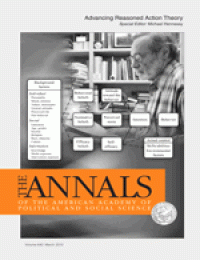
Journal Articles
Understanding Tailored Internet Smoking Cessation Messages : A Reasoned Action Approach
Although message tailoring has been shown to produce experimental effects in previous studies, the cognitive mechanisms through which tailoring works have not been sufficiently studied. Using the integrative model to predict intentions to use the nicotine replacement patch among adult smokers, this study examines how tailoring theoretical elements of the integrative model is effective in changing the theoretical mediators. Participants were randomized into one of two conditions. In the experimental condition, participants received messages tailored to some or all of the underlying behavioral, injunctive normative, or self-efficacy beliefs with the expectation that changing the underlying beliefs would result in experimental differences in the integrative model’s direct measures. This expectation was confirmed. The integrative model also worked well in predicting intentions to perform the target behavior; attitude, perceived normative pressure, and perceived behavioral control accounted for 53 percent of the variance in intentions. Attitude and normative pressure were the strongest predictors of intention. These results provide support for tailoring messages using a reasoned action approach and provide insight into the mechanism through which message tailoring operates.
Availability
No copy data
Detail Information
- Series Title
-
The ANNALS of the American Academy of Political and Social Science
- Call Number
-
-
- Publisher
- Thousand Oak : sage publisher., 2012
- Collation
-
-
- Language
-
English
- ISBN/ISSN
-
00027162
- Classification
-
-
- Content Type
-
-
- Media Type
-
-
- Carrier Type
-
-
- Edition
-
Vol. 640 no. 1, March 2012,pp. 136-149
- Subject(s)
- Specific Detail Info
-
-
- Statement of Responsibility
-
-
Other version/related
No other version available
File Attachment
Comments
You must be logged in to post a comment
 Computer Science, Information & General Works
Computer Science, Information & General Works  Philosophy & Psychology
Philosophy & Psychology  Religion
Religion  Social Sciences
Social Sciences  Language
Language  Pure Science
Pure Science  Applied Sciences
Applied Sciences  Art & Recreation
Art & Recreation  Literature
Literature  History & Geography
History & Geography